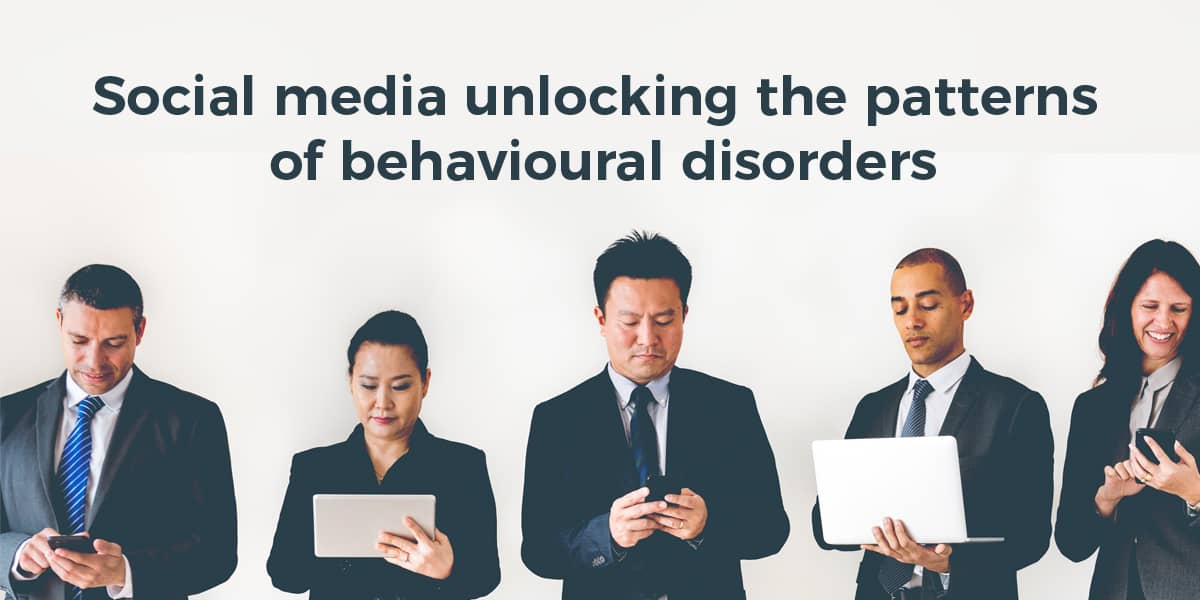Recent research highlights that social media and behavioral disorders are intricately connected.
Today, it’s impossible to imagine a life without social media. In fact, research has shown that social media is associated with negative feelings of anxiety, stress, jealousy, and dissatisfaction.
Popular social media sites like Facebook, Twitter, Instagram, and Snapchat, trigger mental health issues like narcissism, ADHD, and stalking. Regular usage of social media has also been linked to depression, anxiety, and loneliness. Research also says that people who spend more time on social media feel less happy and more depressed.
Not to forget the negative impacts of high screen time. From causing sleep problems to mood swings, obesity to depression high screen time is proven to have detrimental effects on your health.
Social media and Behavioural disorders
The increasing number of trending social media sites has significantly changed the outlook on mental health. The traits of narcissism, stalking, bullying, and threats that were once dormant or limited, have seen a mass upsurge because of social media. Not just that, it has also resulted in a roar of negative feelings like insecurity, dissatisfaction, and depression.
Social media – A rising addiction
Social media is the new drug and its addiction is spreading like wildfire. It is characterized by a compulsive urge to use social media, and constantly post or stalk posts. Addictive social media behavior is much like other substance disorders. It is attributed to dopamine dopamine-inducing effect of social networking sites.
Research shows that social media produces the same neural circuitry that is triggered by gambling or drugs. Studies have shown that the rewarding feeling associated with liking, sharing, and retweeting is the same as that of recreational drugs.
Digital detox is an effective behavioral correction method for social media addiction. Gradually decreasing screen time and breaking the pattern of addiction can help.
Social media and Depression
Several studies have associated the high use of social media with increasing incidences of depression. This is particularly true in the case of teens. About 10% of teens’ active participants on social media platforms are also victims of cyberbullying. These teens are often diagnosed as depressed and even suicidal.
In one study the relationship between using Facebook and the subjective well-being of young adults was examined. The results evidently indicated that there was a decline in the subjective perspective of life and self-esteem in the subjects. This means that these signs might be the potential symptoms of depression.
Another fact that the relationship between depression and social networking sites is that computer-mediated communication often results in an altered impression of the personality and physical appearance of other individuals. These wrong assumptions might initiate feelings of being lesser than others and loneliness, which are the trigger points of depression.
Social media, ADHD, and Anxiety
FOMO is real! Even scientific studies have agreed that the now trending hashtag is a major symptom. Fear of Missing Out is significantly related to anxiety. Constant scrolling down the social networking site or swapping from one side to the other, or maybe one app to the other, is definitely a crucial symptom of anxiety.
The anxiousness that one feels about a just-posted picture not receiving a comment or a like is significantly a warning sign of anxiety. This anxiety might lead to hyperactivity or stressful outbursts.
Hyperactivity on the other hand is related to ADHD. Studies show a significant association between social media usage and ADHD. The thrill that is related to the sound of a ping, or notification relating to a photo posted is significantly a symptom of ADHD. In a study, students who didn’t have ADHD started showing symptoms of ADHD after being introduced to 14 different sites of social media.
It is fair to say that ADHD and anxiety are the crippling effects of being addicted to social media sites.
Social media and Narcissism
Narcissism is the excessive amount of self-obsession and self-righteousness. A study observed that in the real world, people talk about themselves not more than 40% of the time. However, social media has taken this number to a whopping 80%.
Another study showed an increase in narcissistic traits of the participants who increasingly posted selfies and opinions on social platforms. They also qualified for a Narcissistic Personality Disorder diagnosis.
Role of social media in identifying behavioral disorder
While social media has earned a reputation for deteriorating mental health, it can also be a potential tool for identifying behavioral disorders in people. This can open up a new door in the treatment and correction of mental health issues like narcissism, toxic masculinity, bullying, depression, and other mental health issues.
In recent times, health and fitness apps have also helped in identifying and diagnosing health issues. It has further bridged the gap between doctors and patients and helped in availing consultation and treatment.
Final words – Social media and Behavioural disorders
Social media and digitization are the future. As such, identifying adversities and turning them into opportunities can be a game-changer. Using social media to track behavioral disorders can make it a very useful health tool!
Also Read:
7 Health Benefits of Social Media Break
The struggles of a gifted child


3 comments
[…] Social Media and behavioral disorders […]
[…] Also read: Social media and behavioral disorders […]
[…] Social Media and Behavioral Disorders […]